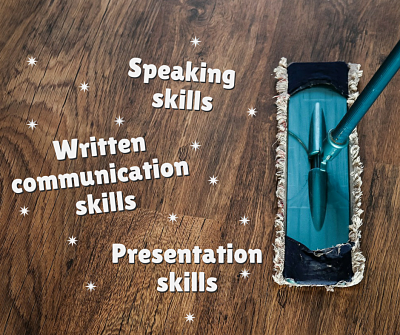 Spring has sprung here in Germany, and it’s not just time to clean house. It’s also a great opportunity to work on improving other areas in your life. So this spring, why not add cleaning and organizing your communication skills to your plans?
Spring has sprung here in Germany, and it’s not just time to clean house. It’s also a great opportunity to work on improving other areas in your life. So this spring, why not add cleaning and organizing your communication skills to your plans?
Choosing which ‘room’ to start in
Sometimes it’s hard to know where to begin. When it comes to spring cleaning your communication skills, you can try different strategies. Try beginning with the communication skill you find easiest and then moving on to the skills you find more challenging. Or jump right in and tackle your biggest communication challenge first. Whether it’s your general speaking skills, written communication skills, or presentation skills, choose one and get started. Take imperfect action, because it can be the easiest action of all.
Assessing what to throw out, improve and acquire
Assess where you are now, and where you want to be. This becomes the gap you want to work on. Ask yourself what you need to discard from your repertoire of skills because it’s not serving you, what you need to improve on, and what you need to learn to be more successful in your communication.
If you know you tend to interrupt when others are speaking, throw out that habit and commit to becoming a more empathetic listener. If you write reports often, assess how you can write more clearly and concisely so that your messages are easier for the reader to understand and act on. If you want to become a sought-after public speaker, learn how to deliver your presentation with confidence and authenticity, with effective slides that clearly support your key messages.
Kick-starting the process
Here are some ideas to help you begin your communication skills spring cleaning:
Speaking skills
- Think before you speak: Get back to basics by planning your strategy to achieve your goal for a conversation or meeting, or practising what you want to say in advance.
- Use your voice: Words aren’t enough. By varying the pace, pitch and power of your voice, you can give meaning and emphasis to your words. Try it out in front of the mirror, with a trusted colleague or even with your dog.
Written communication skills
- Manage sentence length: My advice is to keep sentences shorter. Bite-sized pieces will make it easy for the reader to digest your key messages. Write sentences that contain only 20 to 30 words rather than trying to beat the longest sentence I have ever read in a corporate report (105 words).
- Eliminate redundancy: As authors, we have a tendency to feel like every word we write is important. Therefore, we can’t possibly delete any of those words. The truth is, there are more opportunities to cut out the fluff than we think. So be brutal and cut out words or phrases that don’t add value, are redundant or are not required for emphasis or opinion.
Presentation skills
- Clarify your concept: Make sure your concept is tight. It should be short and concise, even tweetable. Write it in such a way that it hooks your audience and inspires them to action.
- Simplify your slides: Assess each slide to ensure there is only one message per slide no matter how hard that might seem. Challenge yourself to eliminate text and replace it with key words, images, smart art or other graphical representation.
Overcoming procrastination
Let’s face it: Some of us are more challenged by the procrastination monster than others. Strategy comes into play here, too. Take a small step, any step, toward your communication spring cleaning project. The first step will lead to the next step.
You may want to set aside an afternoon to reassess your communication skills in one area or all areas. Then focus on the one aspect that interests you most and take action on that one item. Communication skills are interrelated, so that one topic should lead you to the next topic.
If all else fails, promise yourself a reward for your hard work, such as a hot bath at the end of the afternoon, your favorite guilty food snack, or the freedom to go for a long run to cleanse your mind and body.
Maintaining your forward momentum
Now that you’ve decided on which communication skill(s) to focus, make sure you keep moving forward by addressing communication issues, questions and challenges as they arise. Keep a list of communication goals you want to achieve, progress you’ve made, and areas that need more attention.
I’ll be focusing on writing new articles regularly and refining my core presentation for key note speeches. What will you accomplish during your communication skills spring cleaning? Let us know so we can cheer you on.
All the best,
Tracie
This post was originally posted on Quality Assurance Communication.